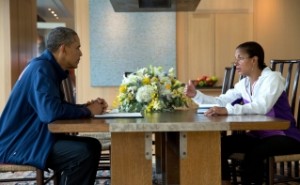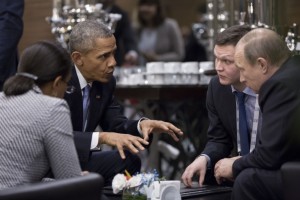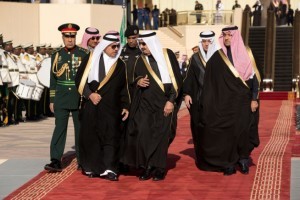You are hereBlogs / Ray McGovern's blog / Intel Vets Take The State Dept. 51" to Task
Intel Vets Take The State Dept. 51" to Task
Intel Vets Call ‘Dissent Memo’ on Syria ‘Reckless’
Editor Note: A group of U.S. intelligence veterans urges President Obama to resist the “reckless” call for a wider Syrian war from 51 State Department officials in a recent “dissent memo.”
MEMORANDUM FOR: Assistant to the President for National Security Affairs
FROM: Veteran Intelligence Professionals for Sanity
Subject: Beware Foggy Bottom Dissent
Dissent and disagreement within the foreign policy and national security bureaucracy only comes to the public’s attention when there are deep and fundamental differences of opinion about the execution and objectives of a U.S. policy. Instances of dissent emerged during the war in Vietnam and have reappeared periodically, e.g., during the Contra War in Central America in the 1980s and the Cold War with the Soviets. We can now add Syria to this list.

National Security Advisor Susan E. Rice briefs President Barack Obama on foreign policy developments during Obama’s summer break on Martha’s Vineyard, Massachusetts, on Aug. 12, 2013. (Official White House Photo by Pete Souza)
The latest media buzz came with the leak that 51 “State Department Diplomats” signed a dissent letter advocating direct U.S. bombing as a tool to force Syria into submission to our government’s dictates. U.S. Foreign Service Officers are a unique collection of highly educated people, who take great pride in having passed the Foreign Service Exam. Yet even among such “bright people,” some succumb to the forces of careerism and the pressures to politicize intelligence.
Unfortunately the dissent signers are calling for America to threaten, and if our bluff is called, commit acts of overt, aggressive war against the forces of a sovereign nation on its own territory. One whose supporters include Russia, the world’s other big nuclear power.
The line of thought — that it is America’s right and duty to employ large-scale death to enforce its leaders’ will on other peoples — adheres to the noxious notion that the U.S.A. enjoys uniquely privileged standing as the “sole indispensable country in the world.” If this was ever an arguably legitimate position, that time is long gone — and today demonstrably blinds its adherents to common sense.
Such thinking is not new. Theodore Roosevelt popularized it as we went to war to annex Spanish territories in the Philippines and Caribbean — at the cost of over half a million indigenous lives — more than a century ago. We saw it, in spades, with the “Best and the Brightest” — those responsible for destroying Vietnam. Three million Vietnamese people died in that war (according to former Defense Secretary Robert McNamara), and another two million or so in its Indochina spin-offs. After this slaughter and the deaths of scores of thousands of its own troops, the U.S. endured a complete and humiliating defeat, one affecting its foreign policy and domestic politics to this day. Their bright successors supported the attack on Iraq in 2003, the catalyst for an outbreak of violence that has brought death reaching into the millions — again — in Iraq, Syria, Libya, Yemen, Somalia and other neighboring locales we’ll eventually read about. This aggression has created millions more traumatized refugees.
The memo, a draft of which was provided to The New York Times (and Wall Street Journal), presumably by one of the State Department employees who authored it, claims American policy has been “overwhelmed” by the unrelenting violence in Syria and calls for “a judicious use of stand-off and air weapons, which would undergird and drive a more focused and hard-nosed U.S.-led diplomatic process.” Furthermore, per the NYT:
“In the memo, the State Department officials wrote that the Assad government’s continuing violations of the partial cease-fire, officially known as a cessation of hostilities, will doom efforts to broker a political settlement because Mr. Assad will feel no pressure to negotiate with the moderate opposition or other factions fighting him. The government’s barrel bombing of civilians, it said, is the ‘root cause of the instability that continues to grip Syria and the broader region.’
“The memo acknowledged that military action would have risks, not the least of which would be increased tension with Russia, which intervened in the war on Mr. Assad’s behalf last fall. Russia subsequently helped negotiate the cease-fire. Those tensions increased on Thursday when, according to a senior Pentagon official, Russia conducted airstrikes in southern Syria against American-backed forces fighting the Islamic State.”

President Barack Obama meets with President Vladimir Putin of Russia on the sidelines of the G20 Summit at Regnum Carya Resort in Antalya, Turkey, Sunday, Nov. 15, 2015. National Security Advisior Susan E. Rice listens at left. (Official White House Photo by Pete Souza)
The dissenters were smart enough to insist they were not “advocating for a slippery slope that ends in a military confrontation with Russia,” but rather a credible threat of military action “to keep Mr. Assad in line.” Easier said than done! The 51 are silent on this point of major importance.
The foundational premise of their dissent is that Assad’s “barrel bombing” (followed by chemical attacks) on civilians provoked civil war in Syria. It’s true that the initial phase of the Syrian Spring seems to have been largely spontaneous. Facts show, however, that outside interveners — primarily the United States, the United Kingdom, Turkey, Israel and Saudi Arabia — cooperated in lighting the match that brought the inferno of civil war. Covert funding and provision of weapons and other material support to opposition groups for strikes against the Syrian Government provoked a military reaction by Assad — which created a pretext for our enlarged support to the rebel groups.
A large body of evidence also suggests that it was the U.S.-backed rebel forces that employed chemical weapons on civilians, and then blamed Assad, in a propaganda effort to advance international public support for overt American intervention.
U.S. actions against Syria have been widely perceived to be part of a broader proxy battle with Iran, being pursued to push back against its expanded influence in the Middle East. But Iran’s emergence as a regional power was not the result of a magical event. It was a direct consequence of the U.S. invasion of Iraq and our subsequent decision to eradicate every vestige of the Baathist party and to install Iraqi Shia leaders with close ties to Iran in the positions of leadership.
We have thus helped start a war and then have the audacity to pretend to be shocked at the consequences of our own action.
The State Department dissenters were not the first to land a blow in this new PR battle over the course of U.S. policy in Syria. The Department of Defense and CIA appear to have entered the fray two weeks ago. According to a report in The Daily Beast, DOD and CIA are in a “cat fight.”
Two Department of Defense officials told that media outlet that they are not eager to support rebels fighting in the city of Aleppo because they are believed to be affiliated with al Qaeda in Syria, or Jabhat al Nusra. The CIA, which supports those rebel groups, rejects that claim, saying alliances of convenience in the face of a mounting Russian-led offensive have created marriages of battlefield necessity, not ideology.
“It is a strange thing that DOD hall chatter mimics Russian propaganda,” one U.S. official, who supports the intelligence community position, wryly noted about Pentagon claims that the opposition and Nusra are one in the same.
The intelligence community, which backed opposition forces in Aleppo, believes ISIS cannot be defeated as long as Assad is in power. The terror group, they say, thrives in unstable territories. And only local forces — like the ones backed by the CIA — can mitigate that threat.
“The status of the opposition is resilient in the face of horrendous attacks by the Syrian and Russian forces,” a U.S. intelligence official explained to The Daily Beast. “The defeat of Assad is a necessary precondition to ultimately defeat [ISIS]. As long as there is a failed leader in Damascus and a failed state in Syria, [ISIS] will have a place to operate from. You can’t deal with ISIS if you have a failed state,” the U.S. official observed.
This unnamed official conveniently ignores the fact that the U.S. is working aggressively to facilitate Syria’s failure. We are astonished. After 15 years of strident rhetoric about waging a war on Al Qaeda, we have now come full circle to witness the CIA and a vocal bloc within the State Department advocate to arm and train an Al Qaeda affiliated group.
It’s impossible to know whether or not the eruption of this dispute is a slap to the face of President Obama simply because the President appeared to support the overthrow of Assad but then backed away from the precipice of militarily taking him out.
The influence of Saudi Arabia in helping push and promote “regime change” in Syria cannot be underestimated. The Saudis also have reportedly funneled significant money into key sectors of the U.S. foreign policy establishment and, it would appear, have obtained considerable influence over our national security policy. More evidence is coming to light that the Saudis have given significant amounts to the Clinton Foundation.

King Salman of Saudi Arabia and his entourage arrive to greet President Barack Obama and First Lady Michelle Obama at King Khalid International Airport in Riyadh, Saudi Arabia, Jan. 27, 2015. (Official White House Photo by Pete Souza)
A recent report on the Petra News Agency site (which was subsequently taken down and claimed to have been a “hack”) raises some important concerns. On Sunday a report appeared on that website that included what were described as exclusive comments from Saudi Deputy Crown Prince Mohammed bin Salman. The comments included a claim that Riyadh has provided 20 percent of the total funding to the prospective Democratic candidate’s campaign. Although the report did not remain on the website for long, the Washington-based Institute for Gulf Affairs later re-published an Arabic version of it, which quoted Prince Mohammed as having said Saudi Arabia had provided with “full enthusiasm” an undisclosed amount of money to Clinton.
In light of Hillary Clinton’s strong advocacy for imposing a No Fly Zone in Syria, which would put us on track for stepped up intervention in Syria and a military confrontation with the Russians, it is natural to wonder if Saudi donations had any influence over the direction of U.S. policy in Syria and support for rebel groups?
In sum, the latest memo from the 51 State Department officers is just one more alarming indication of disarray and failure within the U.S. foreign policy establishment. Notably, most of their children and grandchildren will not be in the military ranks of those called on to fight this war. They are too smart and too “valuable” to engage in such ridiculous endeavors. So something called a “Volunteer Army” was assembled, populated by “volunteers” — mostly from the inner-cities and the small towns of our country, where jobs and education are elusive.
This almost unprecedented dissent letter from 51 emboldened State Department hawks is an alarming new sign of the reckless direction that well-organized elements of the U.S. foreign policy establishment seek to take us. Thus, we appeal to you, as Assistant to the President for National Security, to help President Barack Obama stand firm against such institutional destructiveness and to sort out the disarray and bureaucratic contention among his “Team of Rivals.” If the 51 are sincere in their advocacy of a let’s-try-some-more-of-the-same-but-tougher policy, we would expect them to welcome the personal risks involved in being sent off to bash Bashar with “standoff” — or — “closer-quarter” weapons. This could provide them initially with a sense of affirmation — then later, an education.
(Also see earlier remarks by individual VIPS members: by Ann Wright, here, by Elizabeth Murray and Ray McGovern here; by Philip Giraldi, here.)
For the Steering Group, Veteran Intelligence Professionals for Sanity (VIPS)
William Binney, former Technical Director, World Geopolitical & Military Analysis, NSA; co-founder, SIGINT Automation Research Center (ret.)
Philip Giraldi, CIA, Operations Officer (ret.)
Matthew Hoh, former Capt., USMC, Iraq & Foreign Service Officer, Afghanistan (associate VIPS)
Larry Johnson, CIA & State Department (ret.)
Michael S. Kearns, Intelligence Officer, USAF (ret.); former Master SERE Instructor.
John Kiriakou, Former CIA Counterterrorism Officer and former Senior Investigator, Senate Foreign Relations Committee
Karen Kwiatkowski, former Lt. Col., US Air Force (ret.), at Office of Secretary of Defense watching the manufacture of lies on Iraq, 2001-2003
Edward Loomis, NSA, Cryptologic Computer Scientist (ret.)
David MacMichael, National Intelligence Council (ret.)
Ray McGovern, former US Army infantry/intelligence officer & CIA analyst (ret.)
Elizabeth Murray, Deputy National Intelligence Officer for Near East, CIA and National Intelligence Council (ret.)
Todd E. Pierce, MAJ, US Army Judge Advocate (Ret.)
Coleen Rowley, FBI Special Agent and former Minneapolis Division Legal Counsel (ret.)
Robert David Steele, former CIA Operations Officer
Peter Van Buren, U.S. Department of State, Foreign Service Officer (ret.) (associate VIPS)
J. Kirk Wiebe, former Senior Analyst, SIGINT Automation Research Center, NSA
Ann Wright, Col., US Army (ret.); Foreign Service Officer (resigned in opposition to launching of Iraq War)
This article appeared first on Consortiumnews.com.
- Ray McGovern's blog
- Login to post comments
-

- Email this page
- Printer-friendly version







